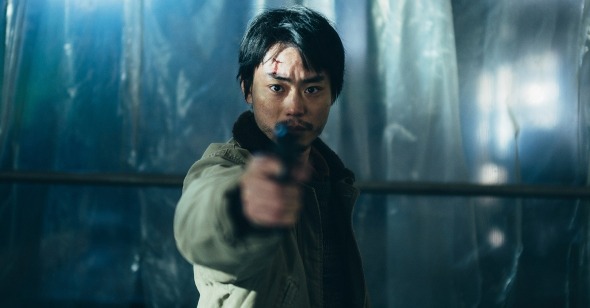IRL
By Dan Schindel
Cloud
Dir. Kiyoshi Kurosawa, Japan, Sideshow/Janus Films
No filmmaker articulates the pervasive alienation of contemporary life quite like Kiyoshi Kurosawa. It’s that persistent tinnitus-like hiss in your mind, the background radiation of unease, the ineffable off-ness of a world divested of third spaces, of ever-increasing isolation, of constantly dividing your attention between tangible and online reality. Kurosawa identified this earlier than most other artists in his 2001 horror masterpiece Pulse. Last year saw two of his features released in Japan. One of them, Serpent’s Path, is a remake of his 1998 film of the same name. The other, Cloud, could be considered a loose refrain of Pulse.
In Pulse, which concerned ghosts entering the world of the living through computers, Kurosawa devised a simple but existentially terrifying premise by extrapolating techno-solitude to an extreme: What if the loneliness we feel now doesn’t stop when we die, but just gets worse and continues forever? Cloud does something similar but updated for an age in which chunky dial-up home PCs have been supplanted by omnipresent smartphones and tablets. Like Pulse, the film’s conceit imagines a nightmare scenario in which an aspect of technologically modulated human interaction—here, online harassment—breaches the borders of reality.
Yoshii (Masaki Suda) is an internet reseller, obtaining medical devices, coveted anime figurines, counterfeit handbags, and much more, and then selling them at fuck-off markups. He’s done well enough to realize the zillennial dream of turning one’s side hustle into full-time work, so he quits his day job at a factory, moves out of his cramped Tokyo apartment into a house in the suburbs with his girlfriend, Akiko (Kotone Furukawa), and expands his business by hiring an assistant, Sano (Daiken Okudaira). But an online community of hate is cohering around Yoshii’s seller account, with disgruntled customers, envious rivals, and cheated suppliers finding each other in forums and comment sections. He feels safe behind the veil of pseudonymity, but the first half of the film follows their communication with mounting dread while Yoshii struggles to find fulfillment. Then in the second half, Yoshii is doxxed and a band of his opps hunt him down to make him pay, the story shifting from slow-burning unease to an escalating, deranged game of cat and mouse.
It’s characteristic of Kurosawa’s skill at lacing even down-to-earth domestic drama with unsettling vibes that this drastic tonal change feels natural. The film’s first half is its own kind of nightmare, depicting Yoshii’s coldhearted entrepreneurship as spiritually hollow. His relationship with the status- and comfort-craving Akiko deteriorates, as neither of them are terribly satisfied by middle-class rurality. Most of the space in their new home is taken up with boxes of merchandise, and the steel and glass fixtures and sterile lighting rhymes with the backrooms, warehouses, and factories that comprise the rest of the movie. Writer Max Read has described a “sigma cinema” of stories about characters who embrace the “grindset” lifestyle of upward mobility through ruthless exploitation of the gig economy, and Cloud is an immediate key text for this nascent canon. The enigmatic Sano appears to have no interiority and lives solely to help his boss refine his business and pursue greater profit—to a degree that he may in fact be a Faustian demon of capitalism.
Once the shit hits the fan, another Kurosawa forebear comes to mind: his 2013 short Beautiful New Bay Area Project, a muted workplace study that jarringly but gratifyingly explodes into martial arts action. Here he pulls off something even more impressive, making cringingly inept and awkward gunfights thrilling and suspenseful. Cloud is just as much a comedy (of manners in the first half, of slapstick in the second) as a thriller. It becomes rapidly apparent that Yoshii’s gangstalkers are aping what they’ve seen in film and television but have no idea what they’re doing. The movie presents the now-clichéd visual of a stranger in a sinister hood manifesting at a window, then makes a running gag out of how he can’t see properly through its eyeholes. Sometimes it will elicit combined cringing of both laughter and anxiety, like when the mob has Yoshii tied up and promises to livestream his immolation, only for them to descend into bickering over how to do it properly.
Much of the film’s last stretch takes place amidst a seemingly endless complex of decrepit factories and warehouses. It’s the perfect location for a vision of modernity as people fighting for crumbs in the ruins of a more prosperous age. Perpetually destabilizing in its plot turns and off-kilter in the best Kurosawa fashion, Cloud imagines the future as humans stamping their boots in each other’s faces, forever.
